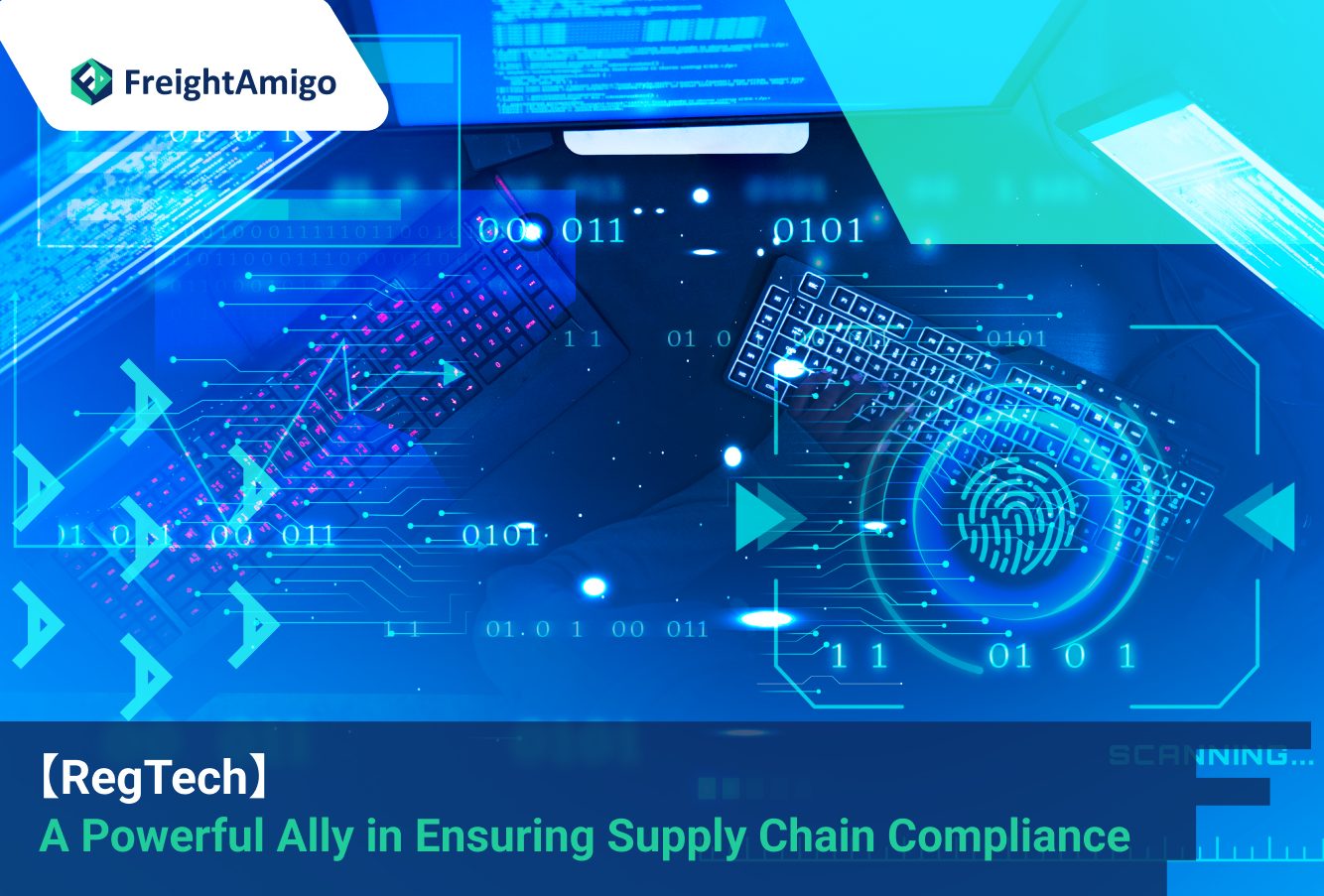February 7th, 2024: Maya Wong– Marketing Analyst at FreightAmigo
Regulatory technology, commonly known as RegTech, has emerged as a game-changer in the realm of regulatory compliance and risk management. This innovative technology promises to streamline, simplify, and automate the daunting processes associated with compliance, thereby reducing operational costs, enhancing accuracy, and boosting overall business efficiency. In this article, we will delve into the world of RegTech and explore its pivotal role in ensuring supply chain compliance.
Want To Compare The Best Express, Air Freight, Sea Freight, Rail Freight & Trucking Rates So As To Have Better Control On Cost?
Understanding the Concept of RegTech
Regulatory Technology, or RegTech, is a field within the broader FinTech sector that specifically focuses on leveraging cutting-edge technologies to address regulatory challenges. Born in the aftermath of the 2008 financial crisis, RegTech was initially conceived to aid financial institutions in navigating the increasingly complex regulatory environment.
RegTech harnesses the power of state-of-the-art technologies such as artificial intelligence (AI), machine learning (ML), big data analytics, and cloud computing to automate and streamline compliance processes, enhance risk management, and ensure overall regulatory compliance.
The Evolution of RegTech: A Historical Perspective
RegTech seeped into the technology domain as a distinct entity in 2015, following the aftermath of the global financial crisis. During this period, it was primarily driven by financial market participants and regulators aiming to capitalize on technology to enhance regulatory compliance and streamline its associated processes.
The evolution of RegTech is intrinsically linked with the broader FinTech revolution and the mounting need for digital regulation processing. As RegTech continues to evolve, cutting-edge technologies such as artificial intelligence and blockchain are expected to play an increasingly significant role in shaping the future of regulatory compliance.
The Core Components of RegTech
RegTech comprises several key components that collectively help organizations in their compliance journey. These components include:
- Regulatory Monitoring: This aspect of RegTech involves real-time tracking and monitoring of ongoing transactions or regulatory updates. Keeping up-to-date with all developments helps organizations spot and prevent fraudulent activities, as well as identify potential compliance and regulatory risks.
- Compliance Management: Compliance management is a critical component of RegTech. It involves ensuring that an organization’s internal systems, policies, and procedures adhere to relevant laws, regulations, and industry requirements. RegTech automates and simplifies these processes, thereby reducing the risk of non-compliance and minimizing the risk of human error.
- Reporting and Data Analytics: Reporting and data analytics enable organizations to analyze data and generate reports for regulatory compliance purposes. RegTech solutions can swiftly process and analyze large volumes of big data, providing valuable insights to inform decision-making and ensure compliance.
RegTech Categories: A Broad Spectrum of Solutions
RegTech solutions can be broadly categorized into three main areas: compliance automation, identity management, and risk management. Each of these categories addresses specific regulatory challenges and offers unique benefits to organizations looking to streamline their compliance processes and mitigate risks.
- Compliance Automation: This process involves the use of technology solutions to automate and simplify compliance processes, thereby reducing the need for manual effort and improving risk management capabilities.
- Identity Management: This domain focuses on verifying customer identities in accordance with regulatory requirements, such as Know Your Customer (KYC), Anti-Money Laundering (AML), and due diligence. Identity management plays a crucial role in protecting both companies and customers from illegal activities such as money laundering and fraud.
- Risk Management: This aspect enables organizations to anticipate and address potential risks. It also offers real-time tracking capabilities, which can be instrumental in detecting potential suspicious activities.
The Perks of Embracing RegTech
RegTech brings a host of benefits to the table for businesses. By providing automation, data analytics, faster reporting, improved risk management, and enhanced cooperation and communication, RegTech is transforming regulatory compliance.
These improvements enable firms to navigate complex regulatory landscapes more efficiently and effectively. Businesses can optimize their compliance efforts, decrease costs, manage risks, and ensure regulatory compliance by embracing technology-driven solutions.
Real-World Applications of RegTech Solutions
RegTech solutions find numerous practical applications, with real-world use cases including Anti-Money Laundering (AML) compliance, Know Your Customer (KYC) verification, General Data Protection Regulation (GDPR) compliance, and many more. These instances demonstrate the potential of RegTech solutions to address a wide range of regulatory challenges and help organizations maintain compliance in an increasingly complex regulatory environment.
The Challenges in the Road to RegTech Adoption
While RegTech offers significant benefits to businesses, its adoption also presents several challenges. These include regulatory complexity, data privacy and security, implementation and integration complexities, the need for a skilled workforce, and issues related to interoperability and standardization.
RegTech: A Powerful Ally for Supply Chain Compliance
In the context of supply chain compliance, RegTech emerges as a powerful ally. It helps automate compliance checks, streamline audit trails, and ensure adherence to international trade regulations. By leveraging RegTech, businesses can effectively mitigate risks associated with supply chain disruptions, trade sanctions, and unethical sourcing practices, thereby ensuring smooth and compliant supply chain operations.
RegTech: A Catalyst for Innovation in the Supply Chain Arena
RegTech is not just a tool for maintaining compliance; it also serves as a catalyst for innovation in the supply chain arena. By automating mundane compliance tasks, RegTech frees up resources, enabling businesses to focus on strategic initiatives such as improving supply chain visibility, enhancing supplier relationships, and driving sustainable practices.
The Future of RegTech in Supply Chain Compliance
As the regulatory landscape continues to evolve, the role of RegTech in supply chain compliance is set to become even more critical. Future advancements in AI and blockchain technology are expected to further enhance the capabilities of RegTech solutions, enabling more accurate risk assessments, real-time compliance monitoring, and advanced fraud detection.
Conclusion
In conclusion, RegTech holds immense promise in revolutionizing the way businesses manage compliance and risk, particularly in the supply chain arena. By leveraging the power of RegTech, businesses can not only ensure regulatory compliance but also drive innovation, enhance operational efficiency, and gain a competitive edge in today’s dynamic and complex business environment.
To stay ahead in the compliance game, it’s high time for businesses to embrace the power of RegTech. The future of regulatory compliance holds considerable promise for firms prepared to adopt innovative solutions as technology continues to evolve.
There Are Different Options For Cargo Transportation. If You Want To Choose The Most Convenient And Suitable Solution, It Is Best To Have The Full Support Of Logistics Experts! If You Are Planning To Ship Goods Overseas, Please Go To The FreightAmigo Page For Inquiries.
Read More:
【Emerging Technologies】 Role of Artificial Intelligence in Freight Technology
【Technology and Innovation】 Blockchain Technology in Enhancing Supply Chain Data Management
【Technology-driven Innovations】 An Overview of Federated Learning Techniques and Applications
If you have any inquiries on logistics/supply chain, feel free to contact FreightAmigo now:
Chat with us online | Hotline: +852 28121686 | WhatsApp: +852 27467829









































